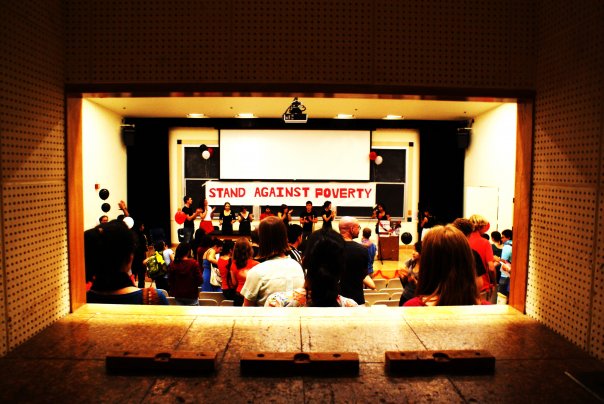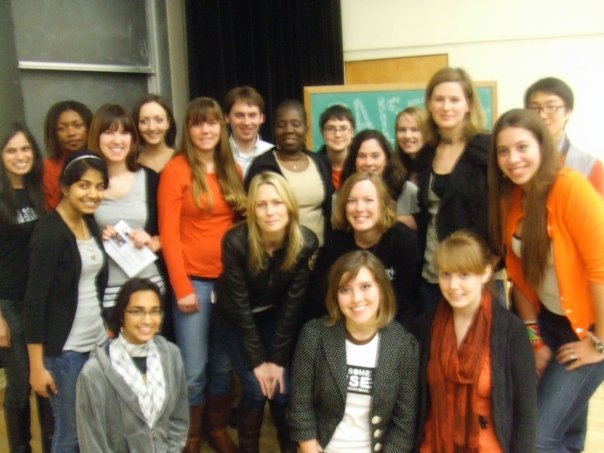Additionally, from a human rights perspective, bottled water is far, far more expensive than tap water, and studies consistently show that it is really no healthier in the developed world, even as our water infrastructure ages and begins to decay, since it is far less regulated. However, one does have to wonder whether our country would have stronger water infrastructure if the more affluent people didn’t have the choice to switch to bottled water when they became uncomfortable with how their tap water tasted, or whether the prevalence of bottled water weakens the push for maintaining the tap water infrastructure upon which the poorest Americans rely.
10.5.13
Amnesty Going Green
Hey Amnesty! This is David King, you’re outgoing
Sustainability Officer! As you may know, UCB Amnesty has been a certified Green
Group by the ASUC Green Certification program for the past few years, and we
are seeking re-certification for this following year. Environmental justice is
a real and important aspect of social justice, and I wanted to start to outline
some of the things that we at UCB Amnesty do to stay green, why it matters, and
what individuals can do.
Today I’ll talk about plastic water bottles.
This semester, UCB Amnesty purchased a 5-gallon
water jug to be used at our events, cutting the need to have individual plastic
water bottles at our events. This water jug can be used along with compostable
cups, or even better, personal reusable water bottles. We encourage members to
bring personal canteens with them to our events so as to create no plastic
water trash.
Why does it matter? Plastic water bottles have
important ramifications for both the environment and social justice concerns.
Every year, we use 1.5 million tons of plastic water bottles, produced from
nearly 50 million gallons of oil. While plastic water bottles can be recycled,
less than 20% actually are, and recycling plastic is no more than a band aid-
plastic can only be recycled into non-recyclable plastic, so all plastic ends
up in the landfill anyway, in much shorter time than you may think. Almost all
plastic ever made in the world is still around- that’s how slowly it decays,
and when that plastic ends up in the ocean, as it often does, it threatens the
seafood that is the major protein source for 1 billion people- mostly in
developing countries.
Additionally, from a human rights perspective, bottled water is far, far more expensive than tap water, and studies consistently show that it is really no healthier in the developed world, even as our water infrastructure ages and begins to decay, since it is far less regulated. However, one does have to wonder whether our country would have stronger water infrastructure if the more affluent people didn’t have the choice to switch to bottled water when they became uncomfortable with how their tap water tasted, or whether the prevalence of bottled water weakens the push for maintaining the tap water infrastructure upon which the poorest Americans rely.
Additionally, from a human rights perspective, bottled water is far, far more expensive than tap water, and studies consistently show that it is really no healthier in the developed world, even as our water infrastructure ages and begins to decay, since it is far less regulated. However, one does have to wonder whether our country would have stronger water infrastructure if the more affluent people didn’t have the choice to switch to bottled water when they became uncomfortable with how their tap water tasted, or whether the prevalence of bottled water weakens the push for maintaining the tap water infrastructure upon which the poorest Americans rely.
So what can individuals do? Well, buy personal
reusable water canteens and enjoy free, healthy tap water, available all over
campus and in all of our homes. Feel free to bring these water bottles to all
Amnesty meetings and events, and encourage other student groups to invest in
water jugs like Amnesty has- and tell all your friends to buy reusable water
canteens as well. Maybe we can turn that 1.5 million tons of plastic to zero if
we can just recognize what little need America has for plastic water bottles.
Stay tuned for more information about Amnesty’s
green initiatives from our incoming sustainability officer, Megan Rae Maurino,
this coming fall!
Subscribe to:
Post Comments (Atom)




No comments:
Post a Comment